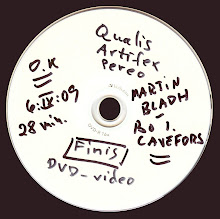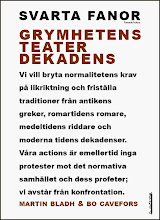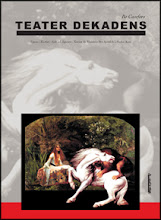
Photo:
B.I.C. 1968
Mårten Björk
WHEREVER BEYOND THE WORLD
When Bo I. Cavefors writes he let the people, outlaws or not, act as if they already was emancipated, as if they are absolutely unaffected of the normal models for a society. As if they are nonmembers of our world.
”He love to act nude right in front of the mirror with a blue-green border. The mirror lean a little. When he get closer to the mirror it seems as if the reflection should crumble him.” The anxiety is qualified because the I in the autobiographies by Bo Cavefors’ Childlich memoirs (Barnsliga memoarer) and The whelp as a young man (Valpen som ung man) is an natural force essential to rule, it can fall down from the mirror and crush the boy when ”alone at home in the summercottage, he place himself (…) in front of the mirror, looking at his reflected image, with the hands he caress his rump, he stretch his chest…”. The reality is to cement oneself as another boy, to control himself as another person, to control himself from the point of a stranger authority. The exhibitionist soon learn that dissipations denigh discipline and asceticism; ”He develop his capacity, and he has this ability already from very young years, to survive when he even when the day is a day of liberty, black the shoes every morning, take care of the clothes, wash them, sew loosen buttons, read books and papers, study, visit the theatres, go to church. All these actions give his spirit and body energy to endure when horniness and hankering force Jacco and him to excesses and debauches.”
The boggerlife in Malmö, London and elsewhere in the 1950-, 60- and seventies are attempered, because there even are the trivias prosaical trivialities... Bookreading, the studies, involvements for theatre and the church are engagemants which prevent Cavefors, his ghanesian lover Jacob, and all the other boys he love and all of them are friends and each other’s lovers since the years at the Jesuit boarding school off London, to go to “the hell [which] was welcoming them when they sniffs cocaines and on evenings and nights carouse the pubs in the Covent Garden quarters.” Everydaynesses, the loathing and the externality of system of rules and disciplin, protect them not specially from the risk to go to hell but also influence their experiences from that nightlife we even in a city like London get in embowered darkness of parks and gaysaunas: ”When horniness throw them to borders of insanity they strike to Hyde Park, the bushes between the park area and Park Lane, or they strike to St. James’s Park, strip quite nude and offer themselves as buckshees to men, or they fuck each other. ( … ) Not so far away they can hear the speakers, the politicos, the preachers and the buskers at Speaker’s Corner, on Park Lane flow the night-traffics, on the sidewalks whores parade and in the Myfairapartments families flock for evening meal. Fraternaly part preachers and the striplings the same world but a sightless border separate reality from reality. The striplings separates and run over the Myfairrealities, because the night never clue the day.
It’s my believe that Cavefors has an absolute animus to think and act in relations and totalities, ergo how his Mayfairexistence de facto impact on his and his friends life on the other side Park Lane, in the darkness of Hyde Park, how night and day really is a twentyfourhour tour, a greater textural totality, how standards/rules and estimates not can be separated as oil and water; conclusion: the Caveforslife is for some people very provocative. To surrender as well the Mayfairsociety as its backbiters repulsion to live beyond the world is the true snag. Because, to captivate this position should be to abjure that sovereign power which is a result of the impotence to add one world to another one, in the repudiate to comply that canoncial folkways and political tactics build on your identification with yourself by analogy with others, identification with enemies and friends, but Cavefors intend that it, in spite of everything, is the egos of itself who is the other; you only need the mirror-image, and you are certified, and you know you exist. Because the I point the versus externatility, indicate the whole life.
Is Cavefors a provocateur? Hardly. His activity is that of an exhibitionist. It’s enough to read some of his essays to understand that his story is one and the only one: his own. Not even in his critics, in his plays and performanceactions he vary the tonic, it’s one and only one and sound always alike. It break from that impersonal power there is attested in something so petty as indicative as the verity of a lonely life.
In traditions of the Christianity the truth hypothesise more as a question about light transmitting capacity than as correspondence or coherence. The same in the life and writings by Cavefors: the unman and the laying bare, are acts interveawed with features of abasement and enjoyment. It is a lusthermeneutic when the confession relate to the genitals as a tucker ideal where all analyses has the start and final. Cavefors’ delineation of the life (living) is constantly sexualized, but unproblematic, something only pay regards to the intensity of the enjoyment in its fulfilment. The sexuality remain practice and concolidate no identity necessary for some extraordinary form of sexual practice. The informality of the sexual activity is what it must be up to. Some fine lines comes in the description from the boarding school in Osby, Sweden, where Cavefors (ten years old) was a year when he had finished the elementary school: “When he a year later get to a boarding school in Göinge he and his friends Tom, Claes and Björn sometimes lock the door for to masturbate and suck eachother and talk and fantasize about the girls.”
The confession behaves to the sex but not to a code (an act) or to a alreade existent identity. Cavefors’ melancholy longing for love and his sexhungerworks have its origin in the western literature of faith and its culture, but, paradoxically Cavefors’ works stand apart from its most symbolized characteristics; the glorification, the explanation. In his works there are no explication why he is more magnetized of men than females, or why sadomasochism or pang for him is pure enjoyment. If you get any explanation it is abstract Manichean and irrelevant: the flesh is depraved, God is only interested of our spirit, our amour and our purposes – and that may be our guidelines the whole life. And, concern to sexuality and normbreaching, the works by Cavefors are absolutely lack of breakdowns. The strip in itself outwear the avowal and make its explanationvalues empty. And it is created very articulated on a stringent prose without mercy. All intents are as if they are present in the words disrobe of the truth, rude depicted through the transparent sentences.
This promtly ivorydiction is the absolutely contrary to all sentencelarded icebergprose. Cavefors carve a break from the subsistence and exemplify a life wherever outside the world. A life where the values and its equivalence-elements are suspended and where intentions not can be attached to facts because white always is white and black noir, never hoity-toity and never inferiority – unable to be compromised, compared to or rated. An Utopia, for certain, but an utopia here and now, where the prose and the life the prose attest on a very radical way break off the idea about sexuality as discoursespawned sociality, as all literature of confession, because the works naiveé oppose every relate of an act to a canonical model of explanation. Whoever are indignant of Cavefors and his works are presumably persons who dreads the radical transformation our manners and habits should be if the system of norms Cavefors try to write himself out of, will be demolished. In his works the individuals, outlaws or not, act as if they already was emancipated, as if they are absolutely unaffected of the normal models for the society. As if they not are members of our world.
Copyright©Mårten Björk, 2007.








No comments:
Post a Comment